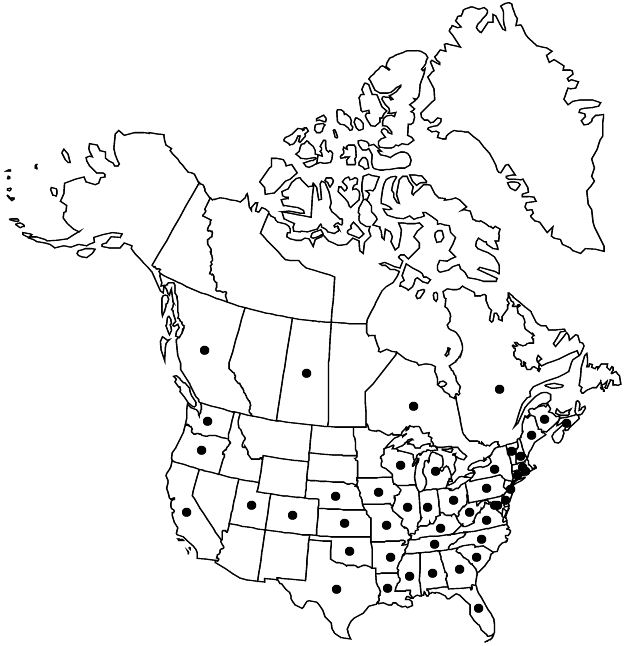Difference between revisions of "Hypericum mutilum subsp. mutilum"
FNA>Volume Importer |
FNA>Volume Importer |
||
| Line 44: | Line 44: | ||
|elevation=0–400 m | |elevation=0–400 m | ||
|distribution=B.C.;N.B.;N.S.;Ont.;Que.;Sask.;Ala.;Ark.;Calif.;Colo.;Conn.;Del.;D.C.;Fla.;Ga.;Ill.;Ind.;Iowa;Kans.;Ky.;La.;Maine;Md.;Mass.;Mich.;Miss.;Mo.;Nebr.;N.H.;N.J.;N.Y.;N.C.;Ohio;Okla.;Oreg.;Pa.;R.I.;S.C.;Tenn.;Tex.;Utah;Vt.;Va.;Wash.;W.Va.;Wis.;widely introduced in Central America;South America;Europe;Pacific Islands (Hawaii;New Zealand). | |distribution=B.C.;N.B.;N.S.;Ont.;Que.;Sask.;Ala.;Ark.;Calif.;Colo.;Conn.;Del.;D.C.;Fla.;Ga.;Ill.;Ind.;Iowa;Kans.;Ky.;La.;Maine;Md.;Mass.;Mich.;Miss.;Mo.;Nebr.;N.H.;N.J.;N.Y.;N.C.;Ohio;Okla.;Oreg.;Pa.;R.I.;S.C.;Tenn.;Tex.;Utah;Vt.;Va.;Wash.;W.Va.;Wis.;widely introduced in Central America;South America;Europe;Pacific Islands (Hawaii;New Zealand). | ||
| − | |discussion=<p>The records of <i></i>subsp.<i> mutilum</i> from British Columbia and Saskatchewan and from California, Colorado, Oregon, and Utah (no details seen) are almost certainly all the result of introduction, as may be some other peripheral records.</p> | + | |discussion=<p>The records of <i></i></i>subsp.<i><i> mutilum</i> from British Columbia and Saskatchewan and from California, Colorado, Oregon, and Utah (no details seen) are almost certainly all the result of introduction, as may be some other peripheral records.</p> |
|tables= | |tables= | ||
|references= | |references= | ||
| Line 68: | Line 68: | ||
|publication year= | |publication year= | ||
|special status= | |special status= | ||
| − | |source xml=https://jpend@bitbucket.org/aafc-mbb/fna-data-curation.git/src/ | + | |source xml=https://jpend@bitbucket.org/aafc-mbb/fna-data-curation.git/src/f6b125a955440c0872999024f038d74684f65921/coarse_grained_fna_xml/V6/V6_811.xml |
|genus=Hypericum | |genus=Hypericum | ||
|section=Hypericum sect. Brathys | |section=Hypericum sect. Brathys | ||
Revision as of 20:17, 24 September 2019
Stems: apical internode shorter than adjacent one or almost absent. Leaf blades variable, rarely broadly ovate or suborbiculate. Inflorescences: branching from 2–10 nodes, mostly dichasial. Sepals not imbricate or broader beyond middle or, if imbricate, leaves not broadly ovate to suborbiculate. 2n = 16.
Phenology: Flowering summer–fall (Jun–Oct).
Habitat: Ditches, marshes, lake margins, desiccated temporary pools
Elevation: 0–400 m
Distribution

B.C., N.B., N.S., Ont., Que., Sask., Ala., Ark., Calif., Colo., Conn., Del., D.C., Fla., Ga., Ill., Ind., Iowa, Kans., Ky., La., Maine, Md., Mass., Mich., Miss., Mo., Nebr., N.H., N.J., N.Y., N.C., Ohio, Okla., Oreg., Pa., R.I., S.C., Tenn., Tex., Utah, Vt., Va., Wash., W.Va., Wis., widely introduced in Central America, South America, Europe, Pacific Islands (Hawaii, New Zealand).
Discussion
The records of subsp. mutilum from British Columbia and Saskatchewan and from California, Colorado, Oregon, and Utah (no details seen) are almost certainly all the result of introduction, as may be some other peripheral records.
Selected References
None.